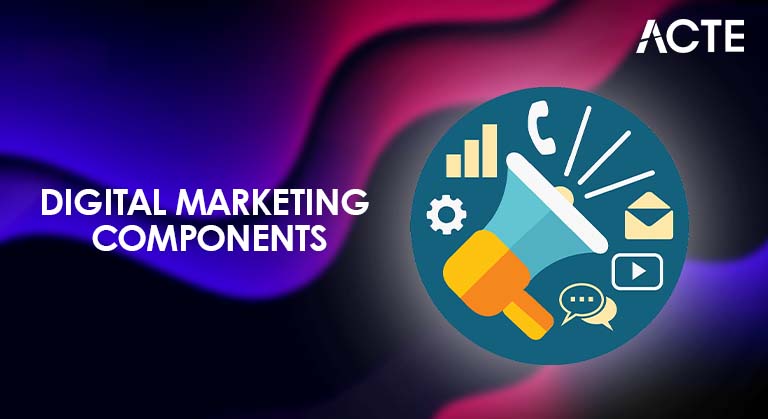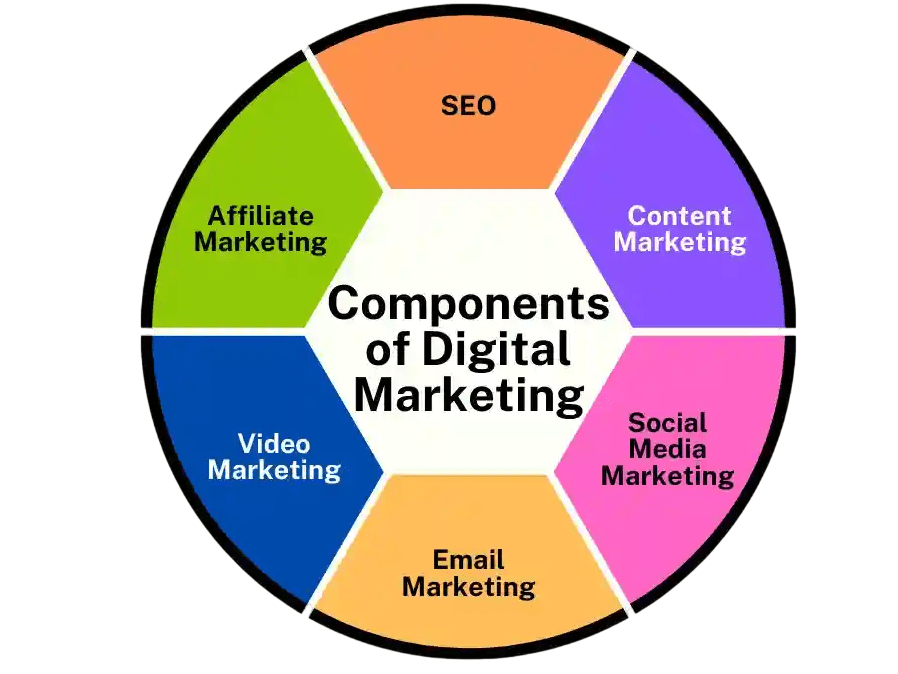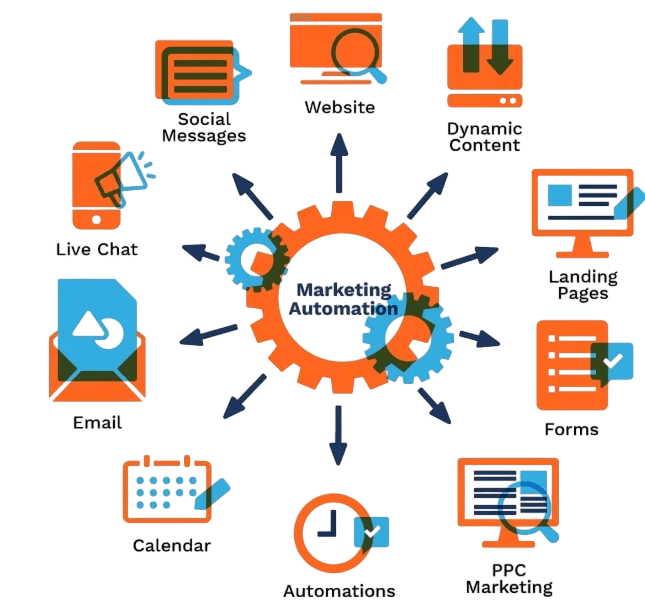
- What is Digital Marketing?
- Why Understanding the Components Matters
- Core Components of Digital Marketing
- Integrating Components for a Unified Strategy
- Measuring Components of Digital Marketing Success
- Future Trends in Digital Marketing
- Marketing Automation
- Conclusion
What is Digital Marketing?
Digital marketing includes all the ways businesses promote their products, services, or brands using the internet and digital devices. This wide field covers various platforms like websites, social media, search engines, mobile apps, and email marketing. One main benefit of digital marketing is that it connects businesses directly with customers in real time a cross-channel capability emphasized in Digital Marketing Training, where learners explore how to leverage each platform’s strengths, synchronize messaging across touchpoints, and build responsive campaigns that adapt instantly to user behavior and feedback. This creates a more interactive communication style, enabling companies to engage with their audience in meaningful ways. Additionally, digital marketing lets businesses tailor their messages to individual customers. This creates a personalized experience that resonates with users. By looking at user behavior, companies can gain useful insights and change their strategies as needed. This ability to track and understand customer interactions helps businesses improve their marketing efforts, which leads to better engagement and higher conversion rates. In a digital world, the chances for reaching potential customers are vast. From targeted ads on social media to informative email campaigns, the options are endless. As technology keeps evolving, the role of digital marketing only becomes more important. It is a crucial tool for businesses aiming to succeed in today’s market. With effective digital marketing strategies, brands can build a strong online presence and nurture lasting relationships with their customers.
Ready to Get Certified in Digital Marketing? Explore the Program Now Digital Marketing Online Training Offered By ACTE Right Now!
Why Understanding the Components Matters
The landscape of digital marketing is made up of numerous interconnected elements. Understanding these components allows marketers and business owners to build effective strategies, optimize performance, and adapt to evolving consumer behavior, as explored in Become a Digital Marketing Specialist, where learners master SEO, PPC, content creation, analytics, and cross-channel execution to thrive in today’s dynamic digital ecosystem.
- Develop well-rounded, effective strategies
- Allocate budget and resources efficiently
- Identify gaps and opportunities in existing campaigns
- Stay competitive in a constantly evolving environment
- Achieve targeted business objectives such as leads, conversions, and brand visibility
Core Components of Digital Marketing
Search Engine Optimization (SEO) is an important part of a digital marketing strategy. It aims to improve a website’s visibility and organic traffic from search engines like Google and Bing. This approach includes several key elements. To complement such SEO-driven efforts with role-specific clarity, exploring Digital Marketing Executive Job Description outlines the responsibilities, skills, and tools required to manage campaigns, optimize content, and drive measurable results across digital platforms. It starts with keyword research to understand how users search. Then, it involves careful on-page adjustments, such as optimizing title tags, meta descriptions, and content. Off-page strategies are also important, like building high-quality backlinks from trusted websites. Technical SEO contributes by boosting site speed, ensuring mobile-friendliness, and improving how easily search engines can crawl the website. SEO is mainly a long-term effort, but it can deliver lasting results when done correctly. This leads to meaningful organic growth and a better online presence for a website.
Content Marketing
Content marketing involves creating and distributing valuable, relevant content to attract and engage a defined audience. Unlike direct advertising, it builds trust and educates potential customers.
Common Content Formats:
- Blog posts
- Infographics
- E-books
- Case studies
- Videos
- Webinars
Content marketing works hand-in-hand with SEO, social media, and email marketing.
Social Media Marketing
Social media marketing is a flexible strategy aimed at increasing brand presence and engagement on various digital platforms like Facebook, Instagram, Twitter, and LinkedIn. By focusing on important goals such as raising brand awareness, building customer loyalty, driving website traffic, and generating leads and sales, businesses can form meaningful connections with their target audience. Success in this digital space depends on consistent messaging, a deep understanding of audience preferences, and providing high-quality content that connects with viewers core competencies explored in Career Paths for Today’s SEO Specialist, where professionals evolve from technical analysts to strategic content leaders by mastering search intent, UX alignment, and scalable optimization frameworks that drive visibility and engagement. Through effective social media marketing, organizations can grow their online presence, build lasting customer relationships, and achieve measurable business growth in an ever-connected world.
Pay-Per-Click Advertising (PPC):
PPC is a model of internet marketing where advertisers pay a fee each time their ad is clicked. It’s a way of buying visits to your site, rather than attempting to earn them organically.
Popular PPC Channels:
- Google Ads
- Bing Ads
- Facebook Ads
- Instagram Ads
- LinkedIn Ads
PPC delivers fast results and allows for precise targeting based on demographics, interests, behavior, and more.
Email Marketing:
Despite being one of the oldest forms of digital marketing, email marketing remains highly effective for nurturing leads and maintaining relationships.
Common Uses:
- Newsletters
- Product promotions
- Event announcements
- Cart abandonment follow-ups
- Customer onboarding
The key to successful email marketing is personalization and segmentation.
Affiliate Marketing:
Affiliate marketing involves partnering with individuals or businesses (affiliates) who promote your products or services in exchange for a commission on sales.
How It Works:
- Affiliates use custom links to promote products
- When a customer clicks and buys, the affiliate earns a percentage
- Businesses gain access to new audiences at a lower risk
Affiliate marketing is particularly popular in e-commerce and software industries.
Influencer Marketing:
Influencer marketing leverages individuals with significant online followings to promote products or services. It combines the power of word-of-mouth and social proof with the reach of social media.
Types of Influencers:
- Celebrities
- Industry experts
- Niche content creators
- Micro-influencers
Choosing the right influencer and maintaining transparency are crucial for credibility and compliance.
Mobile Marketing:
With the rise in smartphone usage, mobile marketing has become a necessity. It involves reaching audiences through mobile-optimized content and experiences.
Mobile Marketing Tactics:
- SMS campaigns
- Mobile apps
- In-app advertising
- Mobile-friendly websites
- Location-based marketing
A responsive and user-friendly mobile presence boosts engagement and conversions.
Online Public Relations (PR):
Online PR refers to managing your brand’s image and reputation on the internet. It includes earning media coverage, securing guest posts, and responding to reviews.

Key Channels:
- Online news sites
- Blogs
- Forums
- Review platforms like Google and Yelp
Positive online PR builds authority, trust, and credibility among potential customers.
Marketing Automation:
Marketing automation involves using software to automate repetitive tasks like email follow-ups, lead scoring, customer segmentation, and social media posting.
Benefits:
- Saves time and resources
- Improves lead nurturing
- Enhances targeting and personalization
- Provides detailed campaign analytics
Popular marketing automation tools include HubSpot, Mailchimp, and ActiveCampaign.
To Explore Digital Marketing in Depth, Check Out Our Comprehensive Digital Marketing Online Training To Gain Insights From Our Experts!
Integrating Components for a Unified Strategy
Each component of digital marketing is powerful on its own, but their true strength lies in integration. A well-rounded digital marketing strategy aligns multiple components to guide users through the buyer’s journey a strategic mindset emphasized in Choose a Career in Digital Marketing, where aspiring professionals learn how SEO, content, PPC, email, and analytics work together to attract, engage, and convert audiences across every stage of the funnel.
For example:
- attracts visitors through search.
- Content marketing educates them.
- Email marketing nurtures the relationship.
- PPC campaigns drive immediate action.
- Social media fosters ongoing engagement.
By creating a consistent brand experience across all digital touchpoints, businesses can maximize impact and improve ROI.
Measuring Components of Digital Marketing Success
To evaluate the success of your digital marketing strategy, it’s important to track performance with Key Performance Indicators (KPIs) and analytics tools. Key metrics like website traffic, conversion rate, cost per acquisition (CPA), click-through rate (CTR), email open rate, return on ad spend (ROAS), and customer lifetime value (CLV) offer valuable insights into how well your campaigns are working performance indicators emphasized in Digital Marketing Training, where learners explore how to track, interpret, and optimize these KPIs to improve targeting, reduce acquisition costs, and maximize long-term profitability across digital channels. Using effective tools like Google Analytics, social media insights, and marketing automation reports helps marketers measure and improve their digital efforts accurately. This approach ensures decisions are based on data and supports ongoing improvements in marketing performance.
Looking to Digital Marketing Training? Discover the Digital Marketing Expert Masters Program Training Course Available at ACTE Now!
Future Trends in Digital Marketing
Digital marketing is constantly evolving. Here are emerging trends shaping the future:
- AI and machine learning: Personalized experiences and smarter automation.
- Voice search optimization: Preparing content for smart speakers and voice assistants.
- Video-first strategies: Emphasis on short-form and live video content.
- Privacy-focused marketing: Adapting to cookie restrictions and data privacy laws.
- Omnichannel marketing: Seamless integration across all digital and physical touchpoints.
Staying ahead of these trends can provide a competitive edge in a crowded marketplace.
Marketing Automation
Marketing automation uses software tools to simplify marketing tasks and improve efficiency. Instead of handling everything by hand, automation helps businesses communicate with customers using the right message at the right time. For instance, if a customer adds a product to their cart but doesn’t complete the purchase, an automated system can send a reminder email or offer a discount to encourage them to buy a behavioral trigger explored in Create a Digital Marketing Report, where marketers analyze cart abandonment flows, email automation strategies, and incentive-based recovery tactics to optimize conversion rates and reclaim lost revenue through personalized outreach. It’s not just about emails; marketing automation can also schedule social media posts, track customer activity on websites, and send personalized offers based on how customers behave.

This approach helps businesses connect with people in a more targeted and meaningful way. The key benefits include saving time, maintaining consistency, and building stronger customer relationships. Automation lets businesses set up campaigns once and then allows the system to handle the rest. It also makes sure every customer feels valued by providing personalized communication instead of generic messages.
Preparing for Digital Marketing Job Interviews? Have a Look at Our Blog on Digital Marketing Interview Questions and Answers To Ace Your Interview!
Conclusion
Digital marketing includes several key parts that work together to improve a business’s online presence, boost engagement, and encourage growth. Important components are search engine optimization (SEO), content marketing, pay-per-click (PPC) advertising, and partnerships with influencers core disciplines covered in Digital Marketing Training, where learners master campaign strategy, audience targeting, and performance analytics through hands-on modules designed to build real-world expertise across every major digital channel. Each of these elements has a distinct role in attracting and converting your target audience. When businesses understand how these parts work both individually and together, they can create smart and effective marketing strategies. For small business owners and marketing professionals, mastering these basic components is essential for achieving success online. By focusing on a clear understanding of each area, you can elevate your marketing efforts. With the right approach, you’ll be ready to navigate the digital world and connect with your audience like never before. Remember that the digital marketing landscape is always shifting. Keeping up with the latest trends and techniques will help you refine your strategies and stay competitive. Whether you are just starting or looking to improve your efforts, make sure to focus on these essential elements to build a strong foundation for your digital marketing activities.




